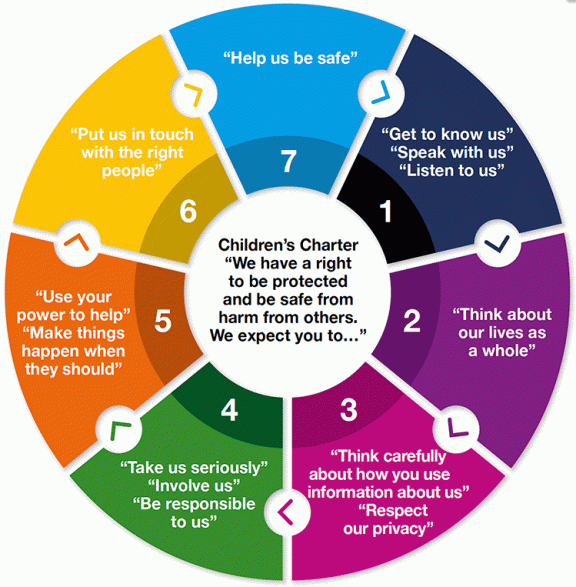Protecting children involves listening to children, their families and carers, being clear and honest about concerns, giving choices and seeking co‑operation, especially when compulsory measures are needed.
Therefore early identification of support for the children and parents & carers needs to be considered and actioned throughout the process.
Expectations of children, young people, parents and carers are represented in the diagrams below.
National Guidance for Child Protection in Scotland 2021: Introduction 14-16

We have a right to be protected and be safe from harm from others. We expect you to...
-
Get to know us, speak with us, listen to us
-
Think about our lives as a whole
-
Think carefully about how to use information about us. Respect our privacy
-
Take us seriously. Involve us. Be responsible to us.
-
Use your power to help. Make things happen when they should.
-
Put us in touch with the right people.
-
Help us be safe
Parents and carers involved in the child protection process. We expect you to....
-
Share understanding... By explaining what you are worried about. By listening to our concerns. By taking time to understand how our family and culture works.
-
Respect us.... By appreciating differences in each child and family. By being honest and reliable in what you say and do through your care and interest in our experience.
-
Talk with us... About what information needs to be shared, when and why. About what is happening. About rights and choices. About what our child needs.
-
Be practical... By offering help early. By explaining what help is available. By working alongside us. By providing help that fits the causes of the main concerns.
-
Imagine, for each child and parent... What we need to prepare for and take full part in meetings. What meetings feel like for us. How advocacy might help us work together.
-
Work as a team... By thinking about child and family as a whole. By co-ordinating plans. By supporting progress one step at a time. By listening to what we say about services.
-
Support good transitions... By providing help as long as needed. By planning big changes together and in time. By thinking through "what-if" contingencies with us.


